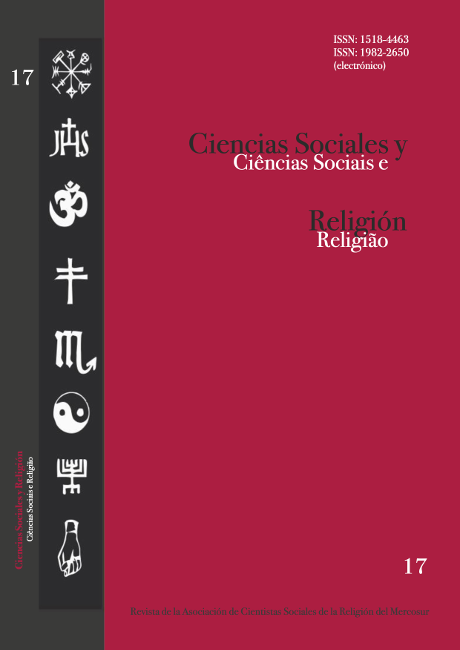Abstract
The city of San Carlos de Bariloche since the late nineteenth century has relied attended different migration flows (European and mainly Chilean) that have contributed to its founding settlement. Since the second half of the last century the city not only includes migrants from other provinces but also becomes a destination for Latin American communities. Since the late seventies the Bolivian population settles in the suburbs of the city and since the nineties a bolivian family moves the image of the Virgin of Urkupiña to Bariloche and kicks off the festivities in his honor. Bolivian migrants in San Carlos de Bariloche, in the key of subalternity, produce local identities that are materialize in our object of study: the Marian devotions and specifically the celebration of the Virgin of Urkupiña. This paper analyzes the “place” of Bolivian women in these religious celebrations taking into account, on the one hand, their condition and the multiplicity of identities that cross it and, on the other hand, the women visibility and invisibility in the featured moments of the ritual.
References
BARELLI, Ana Inés. Migración boliviana en San Carlos de Bariloche: prácticas religiosas y devocionales como estrategias identitarias. Estudios Trasandinos Revista de la Asociación Chileno-Argentina de Estudios Históricos e Integración Cultural, Mendoza, v. 16, n. 1, 2010, p. 114-131.
BARELLI, Ana Inés. Religiosidad Popular: El caso de la Virgen de Urkupiña en San Carlos de Bariloche. Cultura y Religión, Revista de Sociedades en Transición, Universidad Arturo Prat, Chile, v. 5, n. 1, 2011, p. 64-79.
BERTAUX, Daniel, Los relatos de Vida: Perspectiva Entosociológica. Barcelona, Bellaterra, 2005.
BIDASECA, Karina, Vázquez Laba, “Feminismos y (des)colonialidad: recuperando las voces de las mujeres andinas situadas en el noroeste argentino”, En: CD de las X Jornadas de Historia de las Mujeres y Congreso Iberoamericano de Estudios de Género, 2010.
BRIONES, Claudia, “Diversidad cultural e interculturalidad: ¿de qué estamos hablando?”, En García Vázquez, Cristina (comp.), Hegemonía e interculturalidad. Poblaciones originarias e inmigrantes. Buenos Aires: Prometeo, 2008
ESQUERDA BIFET, J.,. Diccionario de la evangelización. Biblioteca de autores cristianos. Madrid, 1998.
ERRÁZURIZ, Pilar, “¿Es posible para las mujeres amar y trabajar?. La Segregación: denominador común de la desigualdad”, En Femeninas, Maria Luisa y Soza Rossi, Paula (comp). Saberes situados/Teorías trashumantes, Facultad de Humanidades y Ciencias de la Educación CINIG-IdIHCS-CONICET. Argentina, 2011, p. 141-161.
GARGALLO, Francesca. Ideas feministas latinoamericanas, Fundación Editorial el perro y la rana, Caracas, 2006, p. 195-219.
HALL, Stuart,“¿Quién necesita “identidad”?”, en HALL, Stuart y DU GAY, Paul (Orgs.). Questions of cultural identity. Sage Publications, Londres. Traducción de Natalia Fortuna, 1996. El texto ha sido publicado en Ford, Aníbal y Martini, Stella (Comp.), Cuadernos de Comunicación y Cultura, No 55, Facultad de Ciencias Sociales, UBA, 2000.
HERNÁNDEZ, Graciela. De “China” a “muchacha” y “plan”. En: Cuadernos del Sur, Historia n. 34, Universidad Nacional del Sur, Bahía Blanca, 2005, p. 221-250.
HISCH, Silvia, Mujeres indígenas en la Argentina, Cuerpo, trabajo y poder, Editorial Biblos, 2008, p. 15 – 26.
LAMAS, Marta. La antropología feminista y la categoría ‘género’, Nueva Antropología, v. 8, n. 30, 1986, p. 173-1986.
LEVITT, Peggy y GLICK SCHILLER, Nina. Perspectivas internacionales sobre migración: conceptualizar la simultaneidad. En Migración y Desarrollo. México, 2004.
MARTÍN, Eloísa. Aportes al concepto de “religiosidad popular” una revisión de la bibliografía argentina. En: Ciencias Sociales y Religión en América Latina. Compilado por María Julia Carozzi y César Ceriani Cernadas, Biblos, Buenos Aires, 2007, p. 61-79.
PEDONE, Claudia; GIL ARAUJO, Sandra. Maternidades transnacionales entre América Latina y el Estado español: El impacto de las políticas migratorias en las estrategias de reagrupación familiar. En: Solé, Carlota; Parella, Sònia Calvancanti, Leonardo. Nuevos retos de transnacionalismo en el estudio de las migraciones. Madrid: Observatorio Permanente de la Inmigración-Ministerio de Trabajo e Inmigración, 2008, p. 149-176.
SANTAMARÍA, Daniel. La cuestión de la religiosidad popular en la Argentina. En: M.E. Chapp, M. Iglesias, M. Pascual, V. Roldán y D. J Santamaría (1991), Religiosidad popular en la Argentina, Biblioteca Política Argentina, Centro Editor America Latina, Buenos, 1991.
SEGATO, Rita. La Nación y sus Otros: Raza, etnicidad y diversidad religiosa em tiempos de Políticas de la Identidad, Prometeo, Buenos Aires, 2007.

This work is licensed under a Creative Commons Attribution-NonCommercial-ShareAlike 4.0 International License.
Copyright (c) 2020 Ana Inés Barelli
